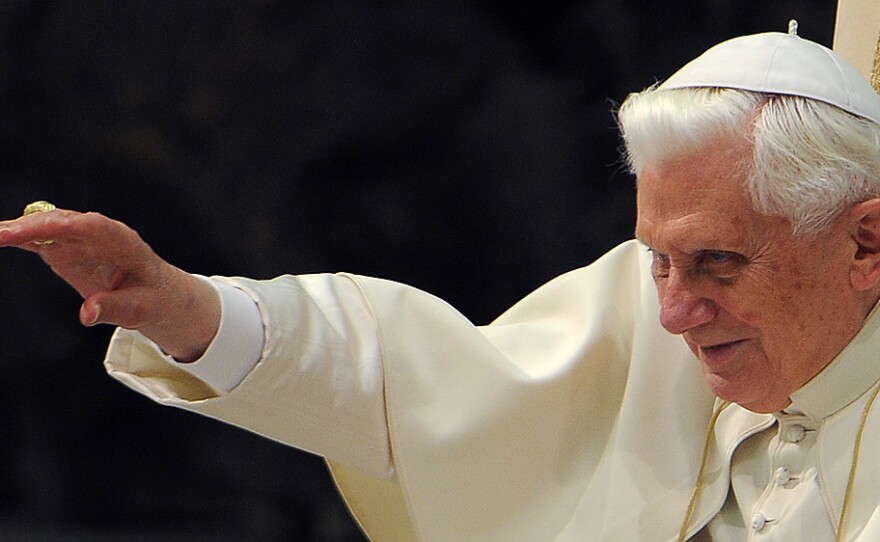Imagine the pope, dressed in his white robes and his half-moon glasses, hunched over his laptop — blogging. We don't know whether Benedict XVI will soon start a blog, but he does have a Facebook page.
In a recent message, he showed his interest in new technologies when he called on priests to "proclaim the Gospel" through blogs, videos and Web sites.
The call to blog took a lot of people by surprise. After all, the 82-year-old from Bavaria is better known for his conservative doctrine and revival of the Latin Mass than for his computer savvy. At first, the Rev. James Martin was startled as well. Martin is the author of The Jesuit Guide to Almost Everything and blogs each day for the Catholic magazine America. Then Martin thought, surely Jesus would blog if he were on the Earth today.
"He didn't sit around and wait for people to come to him," Martin observes. "He went out and met people by the Sea of Galilee who were fishing. He went to tax collectors' booths. He went into synagogues. He went all over the place. And so we need to, figuratively speaking, go out to the ends of the Earth — which includes the blogosphere."
Bloggers Give The Pope Advice
The pope has not announced his own blog. But if he does, he might be wise to listen to the experts.
He should have some favorite YouTube videos that he can just slap up there when he's feeling kind of tired. Like the parade scene from Ferris Bueller. Slap that up there and that's a day's blogging.
"As a blogger, let me say, I have some advice for his holiness," says Elizabeth Scalia, who writes a blog called The Anchoress, which appears on the Web site of the Catholic magazine First Things. "The first being: If I link to you, you must link back to me. There are rules of reciprocation."
Scalia, who is no relation to Supreme Court Justice Antonin Scalia, adds that the pope should aim high.
"He should try to get linked by the bigger blogs," she advises. "He should try to be linked by, for example, Instapundit and the Huffington Post. Because if gets the exposure there, then he can up his blog ad rates."
Presumably, ad revenue isn't high on the pope's list, although there are a few bankrupt dioceses in the U.S. that could use the money. Scalia says while blogging isn't heavy lifting — you rarely get out of your chair, she says — the pope should prepare himself for the unrelenting pressure to post.
"You have to blog every day," she says. "And he's an 80-something-year-old guy, so maybe he's not always going to want to blog."
One solution: "He should have some favorite YouTube videos that he can just slap up there when he's feeling kind of tired. Like the parade scene from Ferris Bueller," she says, referring to the movie Ferris Bueller's Day Off. "Slap that up there and that's a day's blogging."

Hot Links, Comments And Tweets
Of course, a blogging pope would also have to adjust to not only the pace but also the style of the Internet. Benedict is a German theologian famous for his long academic treatises peppered with footnotes. How to adapt?
"Think hot links, not footnotes," advises Martin. "He can write a couple of paragraphs on, say, St. Augustine, or Origen [of Alexandria], or St. Athanasius. And instead of having 50 footnotes, have 50 hot links. People tend to like that on the blogosphere."
Martin has another piece of advice: Be charitable. The Internet can be vicious, but the pope must refrain from ad hominem attacks, which, Martin says, the pope probably knows as a Christian. But should the pope allow comments?
"Only if he has a thick skin," Martin says, laughing. "I would say there are two kinds of angry people. There are angry people, and then there are religiously angry people. And the religiously angry people tend to be angrier than the angry people."
Still, David Weinberger, who writes about politics and culture on Joho the Blog, sees some dangers ahead. He says if the pope wants to spread the Christian message, he might be surprised at the result.
"Putting a message out over the Internet is exactly the same thing as losing total control of your message," he says. "People take it up, they republish it, they make fun of it, they contextualize it. The simple message becomes incredibly complex because of all the ideas that are pulled out and linked to it. That means that the very thing that you wanted in your message was control and what you ended up with was the opposite of control."
Which raises the question: Can something as nuanced as God's word be tweeted?
"Trying to boil things down into tweetable form has a long history" in religion, he says.
Weinberger cites a theologian of his own tradition: Moses, who wrote the Ten Commandments on a couple of tablets. All those commandments — do not murder, do not lie, do not steal, etc. — can easily be boiled down to Twitter's 140 character limit.
What about the Sermon on the Mount? That will require a hyperlink.
Copyright 2022 NPR. To see more, visit https://www.npr.org. 9(MDAzMjM2NDYzMDEyMzc1Njk5NjAxNzY3OQ001))







